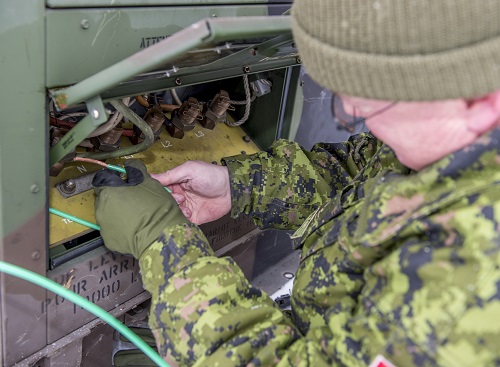Petawawa, Ontario — When Sgt. Jory Nason graduated high school, he swore he was finished with education.
Looking back on his 10 years as an Electrical Generating Systems Technician (EGS Tech) in the Canadian Armed Forces, however, Nason realized that, with the continual learning the job requires, it is as though he never left school.
“I joined the military and I’ve been going to school ever since,” he said with a laugh. “I sure did screw that one up.”
Put most simply, EGS Techs ensure a steady flow of power to military bases or when they are deployed.
The primary responsibilities of the Electrical Generating Systems Technicians are:
- Install, operate, maintain and repair mobile electrical generators and associated control equipment;
- Install, operate, maintain and repair power plant electrical generators and associated control equipment;
- Produce mechanical and electrical drawings;
- Perform brazing/welding and machining work.
“There are backup generators all over the base,” Nason explained. “You check the generators and make sure they operate properly and that they provide power when they’re supposed to. You check the oil, do all your routine maintenance on them so it’s all ready to start.”
On deployment, the job becomes much more complicated, as he realized when training to maintain a state of readiness with 1 Canadian Field Hospital, which is a complete mobile hospital.
“You’re actually operating and maintaining the main power plant with multiple generators producing power at the same time,” he explained. “You also have to lay out the power grid for the camp. Building something like that is massive.”
Those additional challenges, Nason added, come with a welcome sense of accomplishment.
“You close the breaker and the lights start to come on, then you walk through the camp and do all your checks and people say, ‘Hey, thanks for the light, thanks for the power.’ It’s a pretty rewarding feeling. It’s not just you, it’s a team effort, but it makes you feel good that you’re the start of the chain reaction.”
Nason got his first taste of military life in 2001 as a Reserve Infantry Soldier with The Royal New Brunswick Regiment’s 1st Battalion.
“I grew up in Fredericton Junction, New Brunswick so Gagetown’s right around the corner. I used to see the guys in uniform drive by, all the army equipment going by. I thought it looked pretty neat.”
Eventually, Nason went looking for a military role better suited to his natural abilities.
“My dad’s a mechanic, my grandfather’s a mechanic, and I grew up in a garage.”
He learned about the EGS Tech trade and, after transferring to the Regular Force, began training in 2005 at Canadian Forces Base Gagetown.
“The hardest part of our job is trying to remain current on all the different generator manufacturers, and all the related equipment that’s out there,” Nason said.
There are also considerable physical challenges to contend with, he added.
“It’s definitely physically demanding because the cables are big and heavy. Pulling the cables is comparable to doing a 12- or 14-hour day of pure physical work.”
Physical strength and an inclination toward all things mechanical are just two of many qualities that make an ideal EGS Tech, Nason said.
“You have to be an out-of-the-box thinker. There’s no blueprint for a camp. And you definitely have to pay good attention to detail. The engines are very loud and everything’s hot. There are moving parts on the engines and the alternator is creating electricity, so you’ve definitely got to be aware of your surroundings.”
Nason’s earlier joke aside, he said he enjoys the combined experience of constant learning that comes with being an EGS Tech and ongoing physical and weapons training.
“Although you’re a technician, you’re a soldier first; you have to do a fitness test and personal weapons training every year.”
From his current posting with 4th Canadian Division Support Group in Petawawa, Nason reflected on another benefit of the job.
“I lived in Winnipeg for six years,” he said. “I was deployed all over Northern Canada. I was able to see different things that I never would have seen. It’s been an extremely rewarding job.”
